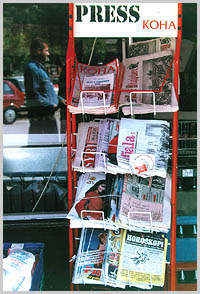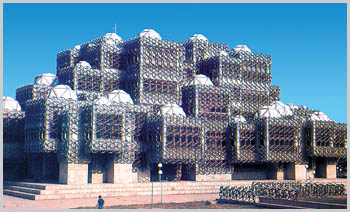

The Federal Republic of Yugoslavia recognizes and guarantees the rights
of the members of the national minorities to the preservation, development and expression
of their ethnic, cultural, language and other specific features, and the use of their
national symbols, in accordance with the International law (Art. 11).
According to the last census in 1991, there lived, in the territory of
the FR of Yugoslavia, beside the Serbs and montenegrins, the members of 26 national
minorities and ethnic groups, who represented one third of the total population. The most
numerous were the Albanians, Bulgarians, Croats, hungarians, Macedonians, Moslems, Roms,
Rumanians, Slovaks, Turks, Wallachians....
Article 41 of the Yugoslav Constitution guarantees to the citizens the
freedom of political, trade unionist, and other association and activities, without
approval, by simple registering by the competent organ.
The members of the national minorities are entitled, in accordance with
the law, to establish educational and cultural organizations and/or associations, financed
on the principle of voluntarily, and may be assisted by the state (Article 47).
Article 45 of the Yugoslav Constitution guarantees the freedom of
expression of national belonging and of national culture, and the use of one’s own
language and alphabet (Addendum 1 - parties, associations and organizations of Albanians,
Turks and Roms in Kosovo and Metohija.
Serbian language and Cyrillic alphabet are in official use in
Yugoslavia. In the regions populated by national minorities, according to the law, their
languages and alphabets are in official use (Article 15). Together with Serbian,
Hungarian, Slovak, Rumanian and Ruthenian are in official use in Vojvodina, and Albanian
in Kosovo and Metohija.
The members of the national minorities are entitled to schooling in
their own respective languages (Article 46). The positive regulations of the FRY open the
possibility of organizing the entire teaching in the languages of the national minorities,
on all levels of education. The law also envisages the organization of bilingual
education, or of additional teaching of mother tongues, with elements of national
cultures.

In Vojvodina, the education in primary schools is performed in 5
languages, secondary education in four languages. High education in Hungarian is organized
at 7 faculties at the university, and in Slovak, Rumanian and Ruthenian languages at 2
faculties each.
The members of the Albanian national community, which represents the
majority population in Kosovo and Metohija (some 90%), boycott the legal educational
system in Albanian. The boycott represents the expression of the secessionist policy based
on the ethnic criterion oriented to the non-recognition of the legal state organs and
institutions of the Republic of Serbia, and the endeavors aimed at the independence of
this part of Serbia and the constitution of the so-called Republic Kosovo. Such endeavors
of the members of the Albanian national minority represent a kind of discrimination.
Before the boycott, there existed 904 Albanian primary schools, 69 secondary schools and
the Pristina University, with 37.000 students, 80% of them being Albanians who studied in
Albanian.

The Albanians in Kosovo and Metohija established a parallel educational
system, based on illegal programs, criteria and textbooks, whose contents were oriented
against the Republic of Serbia and the Federal Republic of Yugoslavia. The diplomas they
issue are not recognized, neither in Yugoslavia nor abroad.
The FRY Constitution guarantees to the national minorities the right to
public information in their own respective languages (Article 46).
There exist, in Yugoslavia, over 150 newspapers and magazines published
in the languages of the national minorities. That number includes 58 daily, weekly and
periodical publications in Albanian, prepared and edited by the members of the Albanian
ethnic community. The annual circulation of those publications, published in Albanian and
owned by private persons, and declared as independent media, is somewhere around 2.5
million copies.
The Radio and TV Pristina broadcasts programs in Serbian, Albanian,
Romani and Turkish. The Novi Sad Television broadcasts its regular programs in five
different languages - Serbian, Hungarian, Slovak, Rumanian and Ruthenian. The radio
stations in Vojvodina broadcast in 8 languages of the national minorities.

The weekly paper of the Turkish national minority
"Tan"